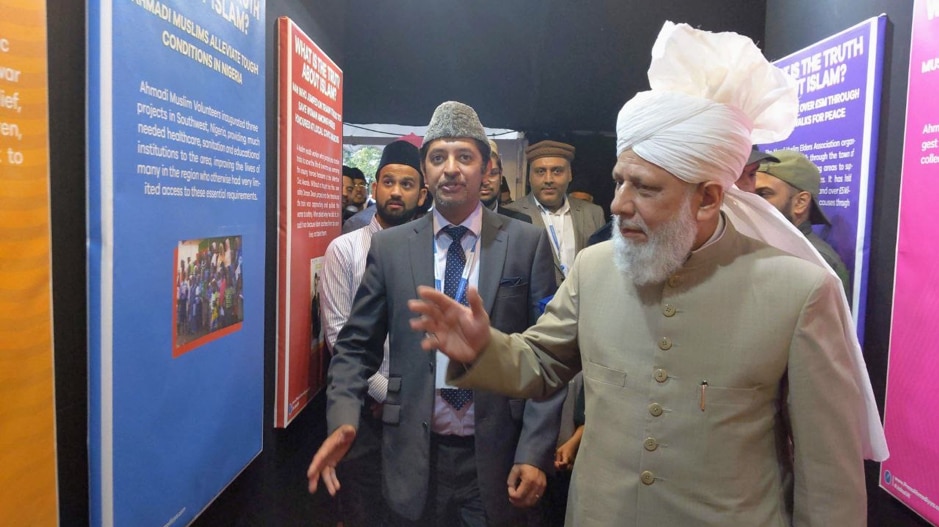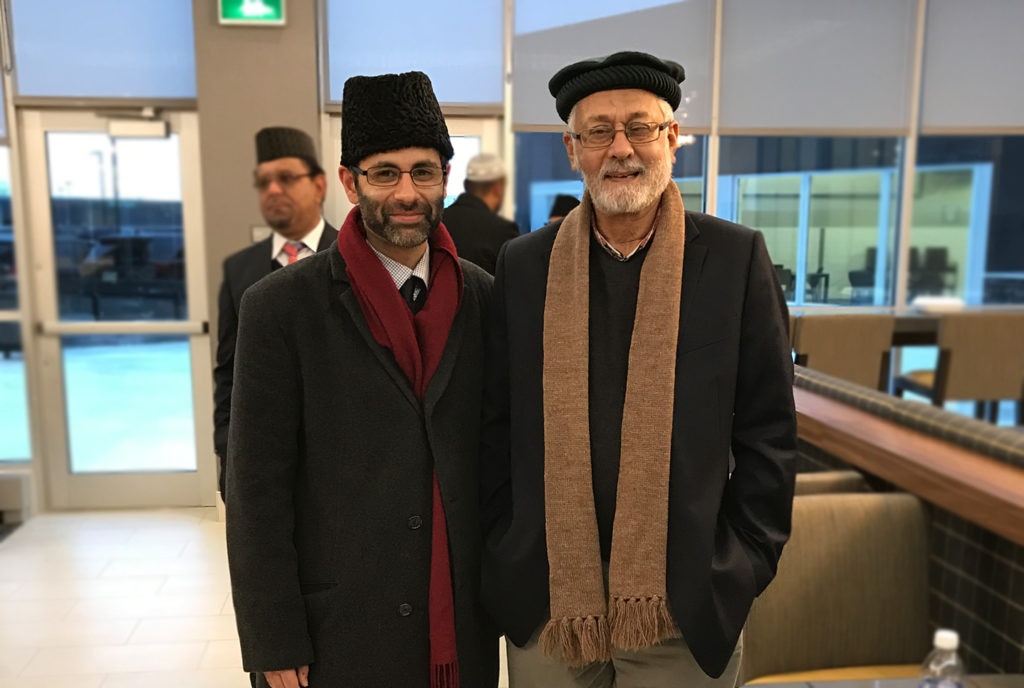
A Conversation with Qamar Suleman sahib
By Abid Khan
Introduction
Over recent weeks, we have been told time and time again that we are living in ‘unprecedented times’. Despite the media’s propensity to exaggerate or sensationalise, this time their assertion feels right. Unlike Ebola or Zika or other viruses that caused panic and fear in recent years, Covid-19 has not been limited to a few nations or a particular region but has spread far and wide and, at the time of writing, is continuing to place much of the world in a state of paralysis.
Speculative green shoots indicating light at the end of what has been a very dark tunnel are slowly starting to emerge, wherein some countries are hopeful that the peak of the pandemic may have been reached. However, in reality, it is far too early to say and fears of a deadly second or third or even a fourth wave abound.
The virus has also had substantial effect on the activities of the Ahmadiyya Muslim Community. Jamaat events have been cancelled or postponed across the world. We have entered Ramadan unable to visit our Mosques.
Yet, with the Grace of Allah, the direct link of Ahmadi Muslims with Khilafat continues through Huzoor’s Friday Sermon, which continues to be broadcast on MTA International – albeit in an empty Mosque for the time being.
Almost every Ahmadi I have spoken to has said they have learned, above all, during this period that we must never take the blessings of Allah the Almighty for granted ever again.
Each year, at this time, many preparations for the Jalsa Salanas in the UK and Germany begin in earnest. Yet, currently it remains entirely unclear when or if it will be possible for them to take place. Time will tell. Till then, I wish to share some memories of last year’s Jalsa UK and Jalsa Germany in the coming weeks.
I start with a conversation I had with Syed Qamar Suleman sahib, Wakil Waqf-e-Nau, who attended the 2019 Jalsa Salana UK as an official representative of Tehrik-e-Jadid Pakistan.
As the son of (late) Sahibzada Mir Daud Ahmad sahib and (late) Sahibzadi Amatul Basit sahiba, Syed Qamar Suleman is a member of the family of the Promised Messiah (as) and the maternal grandson of Hazrat Musleh Maud (ra). He is also the cousin of Hazrat Khalifatul Masih V (aba).
Qamar Suleman sahib, affectionately known as ‘Babbi’, to his friends and family, is also a relative – my Khaloo – the husband of my maternal aunt, Lubna Amatul Kabir, who also travelled to attend last year’s Jalsa.
One of my earliest vivid childhood memories is of waking up one morning in the late 1980s to see my mother, (late) Sajida Hameed, panicked as news reached us that Khaloo Babbi had been shot by a burglar at his home in Rabwah. Thankfully, with the Grace of Allah, he recovered well.
Furthermore, in the early 2000s, I spent some time with him during personal visits to Pakistan. In fact, he was the person who somehow persuaded me to take hold of a menacing looking snake and to abseil from a rather steep Rabwah mountain.
Last summer, I took the opportunity to speak to him about his personal opportunities to observe Khilafat and some of the lessons he had learned during decades of service to the Jamaat.
Childhood memories
As we spoke, I asked Qamar Suleman sahib to share his memories of Hazrat Khalifatul Masih V (aba) as a child.
He told me how they had competed in Atfal competitions and how he remembered one particular competition about cleanliness in which Huzoor came first.
He also reminisced about having had the opportunity to do overnight security duties with Huzoor in Rabwah during their late teenage years and early twenties.
He told how he had been on walks with Huzoor to Ahmad Nagar, farmland near Rabwah, and how it would sometimes suddenly start pouring with rain. Instead of being perturbed, he told me that Huzoor would enjoy the rain even if he became drenched.
As he told me these stories, I wished I could have been there as a boy to see and know Huzoor during his formative years.
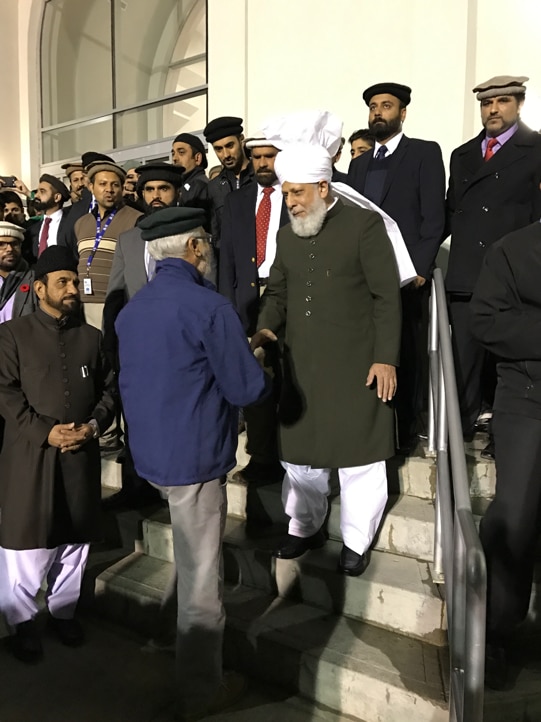
(Qamar Suleman sahib meeting Hazrat Khalifatul Masih V (aba) in Canada 2016)
Qamar Suleman sahib said:
“During childhood I saw Huzoor a lot as our families were close relatives and neighbours. Huzoor’s defining feature at that time, which made him stand apart from other children, was that he was mature beyond his years and whatever task or job he was given he would take seriously and complete it with diligence. Unlike most teenagers or youngsters who get excited or do things in haste, I always found that Huzoor approached things in a calm and meticulous way. Furthermore, even in our childhood and teenage years, I always found that there was weight to the words of Huzoor, even though he was a young boy like us.”
Qamar Suleman sahib continued:
“I am not saying that Huzoor was always serious or reserved. In fact, he displayed a very good sense of humour but his jokes were always decent and would never cross the bounds of decency or appropriateness. Furthermore, unlike some other children, Huzoor never made a cruel joke or spoke in a way that could hurt the feelings of others. This was something that always marked him apart.”
A different relationship
After listening to his youthful memories, I asked whether his relationship with Huzoor had changed with the progression of time.
In answer, Qamar Suleman sahib said:
“I continued to have the opportunity to spend time with Huzoor in the years after he returned to Pakistan from Ghana. For example, once we travelled together along with two other people from Rabwah to Sindh by train. It was an extremely enjoyable journey in which the four of us booked a carriage on the lower level of the train. I recall that a Jamaat Murrabi (Missionary) also happened to be on the train but he had booked a seat on the upper level. The Murrabi was rather heavy-set and so he struggled to fit through the narrow entry to the upper level. We all tried to help push him up but to no avail. We could not help but laugh and in the end the only way to solve the issue was for one of us to swap our seat with the Murrabi.”
Qamar Suleman sahib continued:
“Shortly after that trip to Sindh, in 1997, Huzoor was appointed as Nazir-e-Ala in Pakistan and as the Ameer-Muqami by Hazrat Khalifatul Masih IV (rh) and I would say that was the time when our relationship changed somewhat. For the first time I started to become a little hesitant in front of Huzoor. It was not because of any change in his attitude or style but naturally he was now the most senior office bearer and administrative leader of the Jamaat in Pakistan.”
A blessed migration
Having observed from close range the persecution faced by Ahmadi Muslims in Pakistan for decades, as well as also serving the Jamaat in Nigeria in the 1980s, I asked Qamar Suleman sahib what he considered to be the most challenging period confronted by the Jamaat during his life.
In reply, Qamar Suleman sahib said:
“For those of us in Rabwah, the migration of Khilafat from Rabwah to London was the hardest thing and the greatest challenge we faced. When Khilafat was in Pakistan, we considered ourselves to be an example for other Jamaats because we had the direct training and nearness of Khilafat.
“Certainly, the blessings of Khilafat are spread across the world but there are special blessings for those who are living in close physical proximity to the Khalifa-Waqt. Anyway, now we in Pakistan are the same as other Jamaats and it is the Ahmadis in the UK who we look towards and who we can learn from.”
Qamar Suleman sahib continued:
“It would be wrong to focus only on Rabwah or on Pakistan, rather we should look at the results of the persecution that forced the migration of Khilafat. What has been the end result? Has Ahmadiyyat vanished from the face of the earth? Or has it spread much further afield and progressed in unimaginable ways! Nothing can harm Khilafat-e-Ahmadiyyat or the progress of the Jamaat, whether the Khalifa-Waqt is based in Qadian, Rabwah, the UK or anywhere else. Wherever Allah decrees for Khilafat to be based, it will always prove to be for the betterment of the mission of the Promised Messiah (as).”
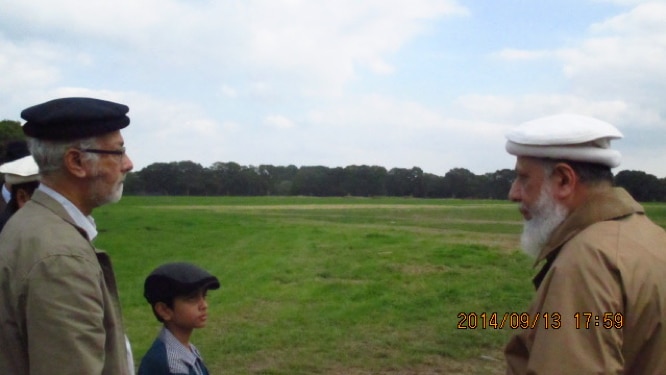
(Qamar Suleman sahib having the opportunity to spend time with Hazrat Khalifatul Masih V (aba) at Hadeeqatul Mahdi in 2014)
Speaking further, Qamar Suleman sahib said:
“Just suppose if Khilafat had remained in Pakistan – yes it would have been good for us Ahmadis living in Pakistan. However, what about the rest of Jamaat? For one, it would have been impossible to establish MTA. Moreover, the UK is considered a centre of the world and so, as the Jamaat spread further afield, London and Islamabad are both appropriate places for our headquarters.
“From here, Huzoor can keep a better eye on the global activities of the Jamaat and Ahmadis can travel to meet him more easily. We should always keep in view that the objective of the Jamaat is to spiritually reform the entire world and not just Pakistan or one or two countries. So yes, we have faced very tough periods in Pakistan but the way Allah has recompensed the Jamaat is beyond measure.”
Thereupon, Qamar Suleman sahib spoke of how he had seen that with every challenge confronted, every trial faced, every sacrifice made – the final consequence had always been in favour of the Jamaat.
Each time, the opponents of Ahmadiyyat thought they would break our spirit and eradicate the Jamaat of the Promised Messiah (as) they were left frustrated and defeated.
Qamar Suleman sahib said:
“Take the example of the Lahore attacks on 28 May 2010. On that day, so many Ahmadis were martyred but, at the same time, I consider that the awareness of the Jamaat increased exponentially after that incident. People who had never heard of Ahmadiyyat came to know of it, as there was so much media coverage and in this way they were introduced to the true teachings of Islam.”
Qamar Suleman sahib further said:
“I have worked in the Jamaat exhibition in Rabwah and so, whilst studying the history of the Jamaat, I have learnt that in the years after grave incidents or periods of persecution the financial sacrifices of the Jamaat across the world have increased massively compared to other years.
“If you look at the amount of Chanda given in the years immediately after 1953, 1974, 1984 and 2010 – which were peak years in terms of persecution – it far exceeded previous years. Furthermore, those incidents, as horrific as they were, caused for the Jamaat to become even more united. You can see and feel how Ahmadis became more attached to the Jamaat and loyal to Khilafat through hardship and trials.”
Our constant guide
As our conversation continued, I mentioned that I was sometimes asked how a person should respond or react if they were ever the recipients of the displeasure of Khalifatul Masih.
Giving his own perspective on this, Qamar Suleman sahib said:
“We should remember that Khalifatul Masih is not only the spiritual leader of Ahmadi Muslims but also the administrative leader of the Jamaat. It is his duty to guide and correct any administrative weaknesses that comes to his notice. If he does not then the Jamaat will cease to progress.
“Similarly, if we are guilty of moral lapses, as our spiritual leader, it is his duty to guide us so we can reform ourselves and to ensure that the vice or error does not spread further within the Jamaat.”
Qamar Suleman sahib continued:
“Thus, if any Ahmadi receives the displeasure of Khalifatul Masih they should remember that his anger is never personal or something he, God forbid, enjoys but is something that is done for our benefit and for the benefit of the Jamaat. His anger or displeasure is actually a manifestation of his love for us. The way to respond, in my opinion, is to sincerely seek forgiveness unconditionally and to do Istighfar.”
Thereafter, Qamar Suleman sahib told me something that illustrated the pure and loving nature of Khalifatul Masih and demonstrated how any sanction was delivered with a heavy heart.
Qamar Suleman sahib said:
“Huzoor does not like for Ahmadis to be punished and desires for them to be forgiven as soon as possible. I remember once I mentioned to Huzoor about an individual who had been sanctioned and was extremely anxious in this regard. Upon this, Huzoor told me he had not yet received any letter from the individual seeking forgiveness and so this was the reason he had not yet been forgiven.”
Qamar Suleman sahib continued:
“On another occasion, Huzoor told me that if a decision is made against an individual by the Qaza Board and he is ordered to pay a sum in redress but is unable to do so, then Huzoor has sometimes paid on his behalf so that he may be forgiven. This is how much he loves each Ahmadi and desires for us to be one united family. If ever he takes any action it is only to ensure the sanctity of the Nizam-e-Jamaat.”
The UK Jalsa Salana and Eid in London
I was speaking with Qamar sahib a few days after he and my Khala had the opportunity to attend the Jalsa and to offer the Eid-ul-Adha prayers behind Huzoor.
Describing how it felt to offer Eid prayers, Qamar Suleman sahib said:
“It was extremely exciting to offer Eid behind Huzoor a couple of days ago, as it was the first time since 1980 that I had this opportunity. That year I was posted to Nigeria and by the time I returned to Pakistan, Khalifatul Masih IV (rh) had migrated to the UK. It is Huzoor’s grace that he permitted us to attend the Jalsa this year and to stay for Eid as well.”
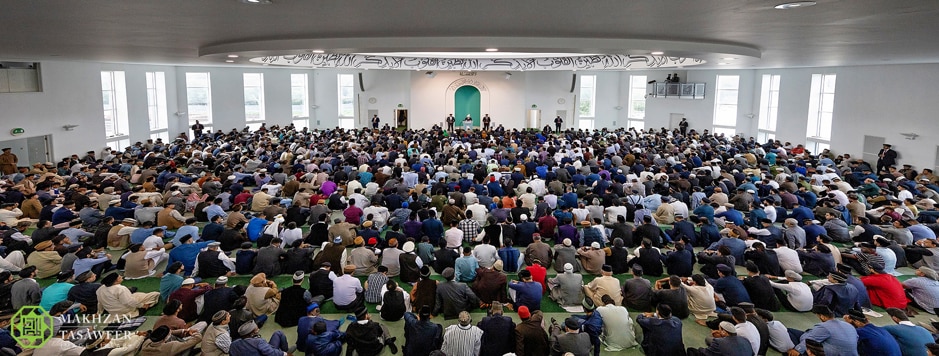
Qamar Suleman sahib continued:
“Probably, it was even more emotional for Lubna, as Lajna members have not been permitted to offer Eid prayers at all in Pakistan since the Lahore attacks on 28 May 2010. So not only was she offering Eid behind Khalifa-Waqt after many years but even the Eid prayer itself. Furthermore, after Eid Namaz, Huzoor graciously held a barbecue lunch for members of his family and we were also fortunate enough to be invited. It was a great honour to attend, along with other relatives from the UK or those from abroad who had extended their stay after the Jalsa.”
I was interested in Qamar Suleman sahib’s perspective on the UK Jalsa which he had attended after several years. He described how things generally appeared better organised compared to his previous visits, though it was the scale of the Jalsa, which had affected him the most.
Qamar Suleman sahib said:
“On the final day, Huzoor announced that 115 countries had been represented at the UK Jalsa. This shows how far our Jamaat has progressed with the Grace of Allah. People from all over the world came together and it is compelling proof of the fact that the message of Ahmadiyyat has truly reached the corners of the earth.”
A unique community
As our conversation ended, I asked Qamar Suleman sahib what he had learned during decades of serving as a Waqf-e-Zindighi.
His answer was one which I, and Ahmadis around the world could surely relate to and bear witness to.
Qamar Suleman sahib said:
“I have learned that our claim to be a unique Jamaat is not false or exaggerated but is entirely true. Every nation of the world, no matter what it may claim, ultimately prioritises its own success and prosperity above others, whereas our Jamaat is the one that cares deeply for every nation and human beings across the world, irrespective of their ethnicity or social status. We are not only seeking to reform humanity but to serve it and Khalifatul Masih is our lynchpin. He is the person who underpins all that is good in our Jamaat. His heart and his prayers are with every Ahmadi and with all humanity. That is the thing that sets us apart.”
I had very much enjoyed sitting with Qamar Suleman sahib in my working area at Islamabad and hearing his personal experiences and narrations pertaining to Khilafat-e-Ahmadiyya.
I was also thankful that there were no mountains or snakes nearby lest he might have tried to involve me in pursuits beyond my comfort zone, as he had in Rabwah all those years ago.
As the somewhat ‘formal’ interview came to an end, I was glad to be able to speak with informality again with Khaloo Babbi.
Any comments or feedback: abid.khan@pressahmadiyya.com
